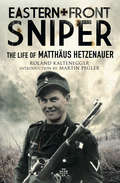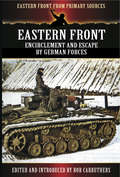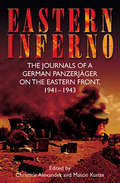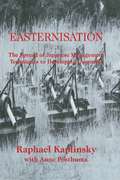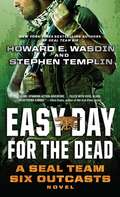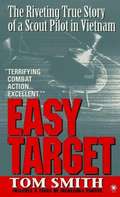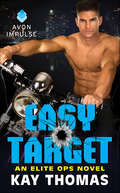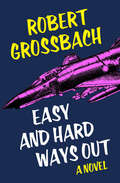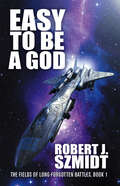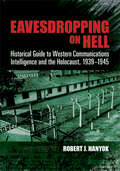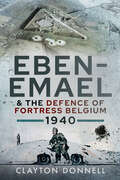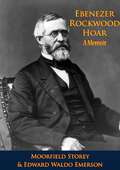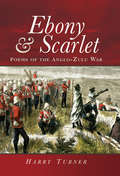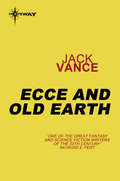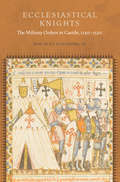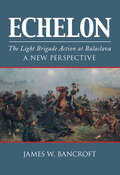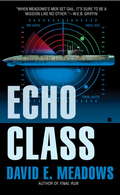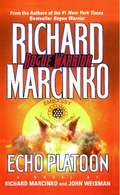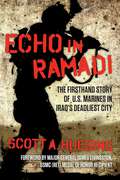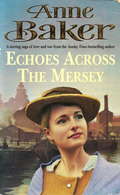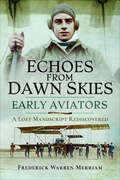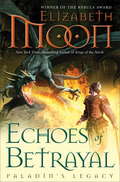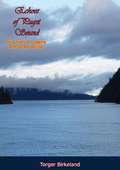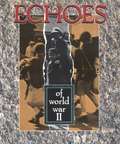- Table View
- List View
Eastern Front Sniper: The Life of Matthäus Hetzenauer (Greenhill Sniper Library)
by Roland KalteneggerEastern Front Sniper is a long overdue and comprehensive biography of one of World War IIs most accomplished snipers.Mathus Hetzenauer, the son of a Tyrolean peasant family, was born in December 1924. He was drafted into the Mountain Reserve Battalian 140 at the age of 18 but discharged five months later.He received a new draft notice in January 1943 for a post in the Styrian Truppenbungsplatz Seetal Alps where he met some of the best German snipers and learned his art.Hetzenauer went on to fight in Romania, Eastern Hungary and in Slovakia. As recognition for his more than 300 confirmed kills he was awarded on the Knight's Cross of the Iron Cross on April 17, 1945.After nearly five years of Soviet captivity Mathus Hetzenauer returned to Austria on January 10, 1950. He lived in the Tyrol's Brixen Valley until his death on 3 October of 2004.
Eastern Front: Encirclement and Escape by German Forces (Eastern Front From Primary Sources)
by Bob CarruthersThe ferocious battles for survival fought by trapped German forces in Russia have become synonymous with that most terrible of all military campaigns. shortly after the war the personal experiences of those who had fought in the battles were collected together as the German report series. These reports include invaluable information from impeccable sources on the pockets formed at Klin, Velikiye Luki, Cherkassy and Kamenets-Podolskiy.Also included are contemporary reports featuring German encirclement tactics, and an in-depth feature on the Kiev operation. This new compilation is essential reading for anyone interested in discovering the real experience of the German forces trapped in Russia.This book is part of the 'Hitler's War Machine' series, a new military history range compiled and edited by Emmy Award winning author and historian Bob Carruthers. The series draws on primary sources and contemporary documents to provide a new insight into the true nature of Hitler's Wehrmacht.The series consultant is David Mcwhinnie creator of the award winning PBS series 'Battlefield'.
Eastern Inferno: The Journals of a German Panzerjäger on the Eastern Front, 1941–43
by Hans Roth&“Remarkable personal journals . . revealing the combat experience of the German-Russian War as seldom seen before . . . a harrowing yet poignant story&” (Military Times). Hans Roth was a member of the anti-tank panzerjager battalion, 299th Infantry Division, attached to the Sixth Army, as the invasion of Russia began. As events transpired, he recorded the tension as the Germans deployed on the Soviet frontier in June 1941. Then, a firestorm broke loose as the Wehrmacht tore across the front, forging into the primitive vastness of the East. During the Kiev encirclement, Roth&’s unit was under constant attack as the Soviets desperately tried to break through the German ring. At one point, after the enemy had finally been beaten, a friend serving with the SS led him to a site—possibly Babi Yar—where he witnessed civilians being massacred. After suffering through a brutal winter against apparently endless Russian reserves, his division went on the offensive again when the Germans drove toward Stalingrad. In these journals, attacks and counterattacks are described in you-are-there detail. Roth wrote privately, as if to keep himself sane, knowing his honest accounts of the horrors in the East could never pass Wehrmacht censors. When the Soviet counteroffensive of winter 1942 begins, his unit is stationed alongside the Italian 8th Army, and his observations of its collapse, as opposed to the reaction of the German troops sent to stiffen its front, are of special fascination. Roth&’s three journals were discovered many years after his disappearance, tucked away in the home of his brother. After his brother&’s death, his family discovered them and sent them to Rosel, Roth&’s wife. In time, Rosel handed down the journals to Erika, Roth&’s only daughter, who had emigrated to America. Roth was likely working on a fourth journal before he was reported missing in action in July 1944. Although his ultimate fate remains unknown, what he did leave behind, now finally revealed, is an incredible firsthand account of the horrific war the Germans waged in Russia.
Easternization: The Spread of Japanese Management Techniques to Developing Countries
by Raphael Kaplinsky Anne PosthumaJapanese industry has shown its superiority in a range of traded goods sectors. It was thought that this competitive advantage arose from the use of electronics-based flexible automation technologies, but it is now clear that the major source of this industrial strength is in the development and diffusion of new management techniques such as just-in-time production and total quality management.A number of Western firms have begun to introduce these management techniques and have begun to reap significant benefits, not just in lowering costs but also in improving product variety and quality, and in being able to satisfy customer needs more effectively. This is a practical and relevant book for those involved in the areas of policy and production, as well as being of relevance to those in the teaching and research communities.
Easy Day for the Dead: A SEAL Team Six Outcasts Novel (The SEAL Team Six Outcasts Novels)
by Howard E. Wasdin Stephen TemplinInfusing the hardcore intensity of their New York Times bestselling memoir, SEAL Team Six, into two pulse-pounding novels, Howard E. Wasdin and Stephen Templin plunge readers into the electrifying action of the Outcasts, the elite SEAL warriors who covertly defy the rules when America&’s safety is on the line. They are the heroes the world will never know…Working under the radar in Special Ops unit Bitter Ash, these men and women take on the missions no one else wants. Every op is the highest possible risk and any moment could be their last. Now, they must parachute into the harsh desert on the border with Afghanistan, to meet a beautiful agent who will lead them to an Iranian biological warfare site they are to destroy with a suitcase-size nuke. And, like most missions, nothing goes according to plan, with a maniacal Revolutionary Guard officer a razor&’s edge away from exposing them. Then the team must free a hostage in Lebanon before the fight takes them halfway around the world—in a frantic battle of courage and stealth that America cannot afford to lose.
Easy Target
by Tom SmithTom Smith didn't seem like the perfect candidate to fight for the United States in the Vietnam conflict, but being recruited for active duty gave him more than he bargained for. Chosen as an aero scout leading an elite squadron on combat missions, his job was to attract Viet Cong fire in order that the enemy be located and destroyed--a job with a fifty percent survival rate. From flying battle runs to rescuing wounded infantry to pulling off daring last-minute escapes, this is the incredible and unforgettable true first-hand account of the unlikeliest hero ever to survive a war.
Easy Target: An Elite Ops Novel (Elite Ops #3)
by Kay ThomasA secret crush turns to passion in this romantic suspense when a woman is rescued by her brother’s best friend, an elite, military trained agent.AEGIS: an elite team of ex-military men who will do anything for their country...and their womenFighting to clear her brother of murder, freelance reporter Sassy Smith is suddenly kidnapped and thrown into a truck with other women who are about to be sold...or worse. When she sees an opportunity for escape Sassy takes it, but she may have just jumped from the frying pan into the fire.Former Marine Bryan Fisher (aka Hollywood) is no stranger to dangerous situations, or to his best friend’s little sister. When he rescues Sassy, Bryan is determined to keep her safe...if he can keep his hands off of her. Because Sassy is all grown up and not at all like the girl he used to know. But he’s got bigger problems. And with enemies coming at them from every corner, Bryan and Sassy will need to work together if they’re going to survive.
Easy and Hard Ways Out: A Novel
by Robert GrossbachAn underachieving engineer building a fighter plane faces a life-changing decision in this Vietnam-era novel perfect for fans of Kurt Vonnegut, Joshua Ferris, and Joseph Heller. This furious, slapstick tale has been praised by the New York Times as one of the &“best and brightest&” novels about the Vietnam War. We follow the travails of Harvey Brank and his fellow employees, all undrafted malcontents working in a spectacularly small-minded, almost Kafkaesque engineering company. Assigned to build a fighter plane and drawn into office intrigues, Brank faces impossible demands. His wife, despairing of his patchy employment history and restlessness, hopes against hope that Brank won&’t get himself fired this time. But what do you do when everything conspires against your vision of a decent, peaceable life?Easy and Hard Ways Out is a blunt, freewheeling look at the men who stay home during wartime—a story about the everyday, with a timeless moral at its heart.
Easy to be a God (The Fields of Long-Forgotten Battles)
by Robert J. Szmidt Robert SzmidtAs humanity colonizes outer space, they encounter a terrifying alien threat in this military sci-fi thriller. In the twenty-fourth century, and human civilization has made a great leap forward, colonizing over a thousand planets and exploring thousands more. But after surviving a bloody civil war, they now face mysterious new threats. In the Xan-4 System, scientists and Federation soldiers observe two alien races from an orbital station. Sergeant Henryan Swiecki must identify a group of people who—against procedures—are trying to save one of the races. At stake is not only the survival of the Warriors of the Bone, but also Henryan&’s life. Meanwhile, in the distant New Rouen System, a recycling ship known as the Nomad finds a millennia-old shipwreck while clearing the fields of long-forgotten space battles. The derelict&’s advanced technology is impressive...but the being found onboard could shake the very foundation of human civilization . . .
Eavesdropping on Hell: Historical Guide to Western Communications Intelligence and the Holocaust, 1939-1945 (Dover Military History, Weapons, Armor)
by Robert J. HanyokThis recent government publication investigates an area often overlooked by historians: the impact of the Holocaust on the Western powers' intelligence-gathering community. A guide for researchers rather than a narrative study, it explains the archival organization of wartime records accumulated by the U.S. Army's Signal Intelligence Service and Britain's Government Code and Cypher School. In addition, it summarizes Holocaust-related information intercepted during the war years and deals at length with the fascinating question of how information about the Holocaust first reached the West.The guide begins with brief summaries of the history of anti-Semitism in the West and early Nazi policies in Germany. An overview of the Allies' system of gathering communications intelligence follows, along with a list of American and British sources of cryptologic records. A concise review of communications intelligence notes items of particular relevance to the Holocaust's historical narrative, and the book concludes with observations on cryptology and the Holocaust. Numerous photographs illuminate the text.
Eben-Emael and the Defence of Fortress Belgium, 1940
by Clayton DonnellIn the early morning of 10 May 1940, the sky literally fell on the heads of the defenders of Fort Eben-Emael, considered to be Belgium's most powerful fortress. This huge structure, with its powerful artillery and infantry weapons, was the key to the Meuse and Albert Canal defences. In the darkness of the pre-dawn, German DFS 230 gliders drifted silently over the southern Netherlands, landing one by one on top of Eben-Emael. Within minutes German Special Forces troops destroyed most of the fort’s weapons and observation capabilities. The following day, the garrison surrendered, and the door to Belgium and France was open. But, as Clayton Donnell relates in this perceptive and meticulously researched study, Eben-Emael was only one of the nineteen forts of the fortified positions of Liège and Namur attacked in May 1940. Three new and sixteen refurbished forts held out for several days, and fought to the death. The story he tells contradicts the common assumption that these static defences were rolled over or bypassed –powerless to resist the overwhelming force of the German combat engineer’s assaults, Stuka bombs and heavy artillery shells. In vivid detail he demonstrates that their importance in the 1940 campaign has been seriously under reported, and he gives clarity to some of the legends that have grown up around the capture of Eben-Emael itself.
Ebenezer Rockwood Hoar; A Memoir
by Edward Waldo Emerson Moorfield StoreyFascinating biography of legal titan, noted abolitionist and diplomat Ebenezer Hoar.Ebenezer Hoar was admitted to the bar in 1835, and served the law at the bar and on the bench for more than a half century. He was a staunch Whig and a proponent of abolition of slavery. He served as Attorney General of the United States for more than a year during the first term of President Grant. He was also a member of the House of Representatives in 1872 and 1873 and an Associate Justice of the Supreme Judicial Court.
Ebony & Scarlet: Poems of the Anglo-Zulu War
by Harry TurnerThe nineteenth century saw the British army engaged in a series of conflicts around the globe. Iin almost every continent the redcoats of British soldiers seemed to be in perpetual action against enemies of the Crown. The Anglo-Zulu War, fought in southern Africa in 1879, was one of the bloodiest of these conflicts, and one of the most famous, and it has fascinated historians ever since. But the story has never, until now, been re-told in verse and that is what Harry Turner does in the sequence of poems he has composed for this memorable volume. He concentrates on the relationship between the British and the Zulus, on the politics and ambition that gave rise to the war and on the series of bloody battles that followed in particular at Isandlwana, Rorke's Drift and Ulundi. Graphically he recalls how King Cetshwayo's Zulu warriors, armed mainly with spears, gave the British a mauling before they were finally overcome. The story has often been told before, but rarely in such an original and evocative way. Harry Turner's work will be an absorbing introduction to the subject for readers who are coming to it for the first time, and it will add a new dimension to the understanding of readers who are familiar with the many more conventional histories of the conflict.
Ecce and Old Earth
by Jack VanceThis sequel to "Araminta Station", features the character of Glawen Clattuc, who helped save the unique planet Cadwal. The charter that granted Cadwal conservation has disappeared - and Glawen and Wayness Tamm are sent across a variety of planets to try and retrieve it.
Ecclesiastical Knights: The Military Orders in Castile, 1150-1330 (Fordham Series in Medieval Studies)
by Sam Zeno Conedera“Warrior monks”—the misnomer for the Iberian military orders that emerged on the frontiers of Europe in the twelfth century—have long fascinated general readers and professional historians alike. Proposing “ecclesiastical knights” as a more accurate name and conceptual model—warriors animated by ideals and spiritual currents endorsed by the church hierarchy—author Sam Zeno Conedera presents a groundbreaking study of how these orders brought the seemingly incongruous combination of monastic devotion and the practice of warfare into a single way of life.Providing a detailed study of the military-religious vocation as it was lived out in the Orders of Santiago, Calatrava, and Alcantara in Leon-Castile during the first century, Ecclesiastical Knights provides a valuable window into medieval Iberia. Filling a gap in the historiography of the medieval military orders, Conedera defines, categorizes, and explains these orders, from their foundations until their spiritual decline in the early fourteenth century, arguing that that the best way to understand their spirituality is as a particular kind of consecrated knighthood.Because these Iberian military orders were belligerents in the Reconquest, Ecclesiastical Knights informs important discussions about the relations between Western Christianity and Islam in the Middle Ages. Conedera examines how the military orders fit into the religious landscape of medieval Europe through the prism of knighthood, and how their unique conceptual character informed the orders and spiritual self-perception.The religious observances of all three orders were remarkably alike, except that the Cistercian-affiliated orders were more demanding and their members could not marry. Santiago, Calatrava, and Alcantara shared the same essential mission and purpose: the defense and expansion of Christendom understood as an act of charity, expressed primarily through fighting and secondarily through the care of the sick and the ransoming of captives. Their prayers were simple and their penances were aimed at knightly vices and the preservation of military discipline. Above all, the orders valued obedience. They never drank from the deep wellsprings of monasticism, nor were they ever meant to.Offering an entirely fresh perspective on two difficult and closely related problems concerning the military orders—namely, definition and spirituality—author Sam Zeno Conedera illuminates the religious life of the orders, previously eclipsed by their military activities.
Echelon: The Light Brigade Action at Balaclava - A New Perspective
by James W BancroftLord Cardigan’s cavalry charge on 25 October 1854 at the battle of Balaclava ‘into the valley of death’ is surely one of the most famous actions in military history. Is there anything new to say about it in print? Yes there is, because most publications have concentrated on commanding officers Lucan, Cardigan and the fatal actions of Nolan. But there were 670 men in the charge and by collating the evidence from the many eyewitnesses James Bancroft offers a new and more accurate appraisal of events. Cardigan’s description of the action was quoted at length in the House of Commons: ‘… with the batteries vomiting forth upon us shells and shot, round and grape, with one battery on our right flank and another on the left … when we came to within a distance of fifty yards from the mouths of the artillery which had been hurling destruction upon us, we were, in fact, surrounded and encircled by a blaze of fire.’ One question of course – which the author, who has been studying the subject for many years, addresses – is how anyone survived.
Echo Class
by David E. MeadowsJune, 1967. In the waters of the Pacific, Captain Danny McDonald of the USS Monaghan is ordered to track down a Soviet submarine—without triggering World War III.
Echo Platoon (Rogue Warrior #9)
by Richard Marcinko John WeismanIn seven smash Rogue Warrior bestsellers, Richard Marcinko and John Weisman have delivered nonstop action and explosive thrills. Now the Rogue Warrior writes a new set of rules for the shadowy world of Black Ops.... Dangerous times require dangerous men. And there isn't a man alive more deadly than the Rogue Warrior. Captain Richard "NMN" Marcinko must uncover the truth behind recent attempts to destabilize Azerbaijan, the tiny former Soviet republic that holds the key to the oil-rich Caspian Sea. A pipeline to the West is planned, and both Russia and Iran want control. But there are hidden players, including billionaire Steve Sarkesian; just how he ties in with the Russkies and Arabs is unclear, but treachery is afoot to choke off America's black gold. Enlisting his elite SEALs, Marcinko races to the heart of the Middle East, doing what he does best -- breaking rules and cracking heads until the only thing left standing is justice.
Echo in Ramadi: The Firsthand Story of US Marines in Iraq's Deadliest City
by Scott A. Huesing Major General James Livingston"In war, destruction is everywhere. It eats everything around you. Sometimes it eats at you." —Major Scott Huesing, Echo Company CommanderFrom the winter of 2006 through the spring of 2007, two-hundred-fifty Marines from Echo Company, Second Battalion, Fourth Marine Regiment fought daily in the dangerous, dense city streets of Ramadi, Iraq during the Multi-National Forces Surge ordered by President George W. Bush. The Marines' mission: to kill or capture anti-Iraqi forces. Their experience: like being in Hell. Now Major Scott A. Huesing, the commander who led Echo Company through Ramadi, takes readers back to the streets of Ramadi in a visceral, gripping portrayal of modern urban combat. Bound together by brotherhood, honor, and the horror they faced, Echo's Marines battled day-to-day on the frontline of a totally different kind of war, without rules, built on chaos. In Echo in Ramadi, Huesing brings these resilient, resolute young men to life and shows how the savagery of urban combat left indelible scars on their bodies, psyches, and souls. Like war classics We Were Soldiers, The Yellow Birds, and Generation Kill, Echo in Ramadi is an unforgettable capsule of one company's experience of war that will leave readers stunned.
Echoes Across the Mersey: A poignant saga of love in a desperate time
by Anne BakerWith the Great War looming, one young woman also faces obstacles closer to home. Anne Baker's Echoes Across the Mersey is a thrilling saga of an impossible love, set under the storm clouds of war and class. Perfect for fans of Cathy Sharp and Katie Flynn.'A heartwarming story, Echoes Across the Mersey is the type of distinctly English book best read when sitting in the garden' - Liverpool EchoIt's August 1914, and the threat of war weighs heavily on the people of Liverpool, but not on Sarah Hoxton. For Toby Percival, the son of her employer, is in love with her. Her mother fears they'll both lose their jobs when Toby's father finds out, but Sarah's prepared to risk everything for Toby's love. Maurice Percival is furious when he discovers his son is involved with a factory girl. Determined to defy his father, Toby joins the army. Sarah is left facing what seem to be insurmountable obstacles, but with the help of her friends, family and a strength she never knew she possessed, she discovers there is a light at the end of the tunnel, though it shines from a different direction to the one she expected. What readers are saying about Echoes Across the Mersey: 'I could not put it down and read it within a couple of days... the author has a way of making you visualise everything from the people to the places, and is able to bring out so many emotions whilst you are reading.'
Echoes from Dawn Skies: Early Aviators: A Lost Manuscript Rediscovered
by Frederick Warren MerriamNo one could doubt that Frederick Warren Merriam was one of the earliest and most important of Britain’s aviation pioneers. Indeed, he taught many of the others to fly; men such as Air Chief Marshal Sir Philip Joubert de la Ferte, Air Commodore P.F.M. Fellowes (who led the aerial Houston Everest Expedition), and Sub-Lieutenant R.A.J. Warneford VC, the first pilot to down a Zeppelin. In his later years, Merriam decided that he wanted to compile a book that presented ‘a more personal and intimate picture than has yet been produced by aviation history writers of the civil pioneers of British flying’. It was no simple task. ‘Some two years ago,’ Merriam continued, ‘I conceived an idea and set to work most energetically to hunt up all the survivors of those wonderful days, to ask them if they would each contribute a story of a personal nature, something that had never before been published. It was a tall order and admittedly my hopes were not too high of finding sufficient material of the sort to fill a book. A tireless search ensued for more than a year. Many obstacles and disappointments assailed me. Of some “oldtimers” no trace could be found, others had passed on and one or two were too tired to trouble. However, after a little gentle persuasion [many] made the effort.’ The remarkable collection of stories that Merriam gathered together was never published, his death in 1956 curtailing the project. For more than sixty years the manuscript lay hidden away, all but forgotten, until it was rediscovered in 2013.
Echoes of Betrayal
by Elizabeth MoonThe action continues fast and furious in this third installment of Elizabeth Moon's celebrated return to the fantasy world of the paladin Paksenarrion Dorthansdotter. This award-winning author has firsthand military experience and an imagination that knows no bounds. Combine those qualities with an ability to craft flesh-and-blood characters, and the result is the kind of speculative fiction that engages both heart and mind.All is not well in the Eight Kingdoms. In Lyonya, King Kieri is about to celebrate marriage to his beloved, the half-elf Arian. But uncanny whispers from the spirits of his ancestors continue to warn of treachery and murder. A finger of suspicion has been pointed toward his grandmother, the queen of the Ladysforest elves, and that suspicion has only intensified with time and the Lady's inexplicable behavior. Clearly, she is hiding something. But what? And why?Meanwhile, in Tsaia, the young king Mikeli must grapple with unrest among his own nobility over his controversial decision to grant the title and estates of a traitorous magelord to a Verrakaien who not only possesses the forbidden magic but is a woman besides: Dorrin, once one of Kieri's most trusted captains. When renegade Verrakaien attack two of Dorrin's squires, suspicion and prejudice combine to place Dorrin's life at risk--and the king's claim to the throne in peril.But even greater danger is looming. The wild offspring of a dragon are on the loose, sowing death and destruction and upsetting the ancient balance of power between dragonkind, humans, elves, and gnomes. A collision seems inevitable. Yet when it comes, it will be utterly unexpected--and all the more devastating for it.From the Hardcover edition.
Echoes of Puget Sound: Fifty Years of Logging and Steamboating
by Torger BirkelandIn the early days of the twentieth century, the Mosquito Fleet played a colorful and important part in the life and economic development of the Puget Sound country. The fleet was composed of a myriad of steamboats of all sizes—each with a personality of its own. Many of these vessels have become legendary. Scurrying around the Sound in every sort of weather, the only links between many towns and settlements, these craft formed the largest and most picturesque fleet of its kind the world has known. They wrote an important chapter in Pacific Northwest history. This is their story, told by one who helped to bring the Mosquito Fleet to its golden age and then watched it wane.ECHOES OF PUGET SOUND is also the story of Torger Birkeland, who came to America as a young lad with his family and started working as a whistle punk in loggings at the age of eleven. At twenty he finally turned to sea, and in this book, he gives a vivid account of his experiences of life on Puget Sound in those early 1900s.Richly illustrated throughout with black & white photographs.
Echoes of War
by Tania BlanchardSet in Mussolini&’s Italy amid great upheaval, this is the story of one woman&’s determination to find her place in a world that men are threatening to tear apart. Another heart-rending novel inspired by a true story from Australia's bestselling author of The Girl from Munich. Calabria, Italy, 1936 In a remote farming village nestled in the mountains that descend into the sparkling Ionian Sea, young and spirited Giulia Tallariti longs for something more. While she loves her home and her lively family, she would much rather follow in her nonna&’s footsteps and pursue her dream of becoming a healer. But as Mussolini&’s focus shifts to the war in Europe, civil unrest looms. Whispers of war are at every corner and her beloved village, once safe from the fascist agenda of the North, is now in very real danger. Caught between her desire to forge her own path and her duty to her family, Giulia must draw on the passion in her heart and the strength of her conviction. Can she find a way to fulfill her dreams or will the echoes of war drown out her voice? PRAISE FOR TANIA BLANCHARD &‘Captures the intensity of a brutal and unforgiving war, successfully weaving love, loss, desperation and, finally, hope into a gripping journey of self-discovery.&’ Courier Mail &‘An epic tale, grand in scope … Packs an emotional punch that will reverberate far and wide.&’ Weekly Times &‘A tumultuous journey from order to bedlam, and from naive acceptance of the status quo to the gradual getting of political wisdom.&’ Sunday Age &‘An original and innovative take on the World War II genre that captures the hauntingly desperate essence of the war. Tania Blanchard has written yet another spectacular novel. Don&’t miss this.&’ Better Reading
Echoes of World War II
by Trish MarxPresents the stories of six people from different parts of the world whose childhoods were shaped by their experiences during World War II.
